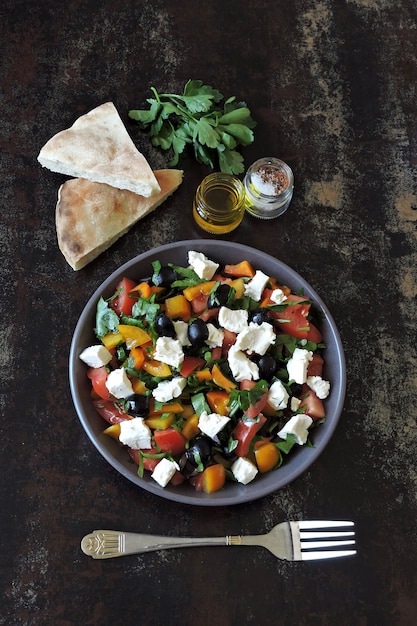The Complete Mediterranean Diet Guide: Recipes, Benefits & 7-Day Plan

The Complete Guide to the Mediterranean Diet explores its core principles, health benefits, delicious recipes, and a practical 7-day meal plan, providing a comprehensive approach to adopting this nutritious and flavorful lifestyle.
Embark on a journey to better health with The Complete Guide to the Mediterranean Diet: Recipes, Benefits, and a 7-Day Meal Plan. Discover how this flavorful and nutritious diet can transform your well-being.
Understanding the Mediterranean Diet
The Mediterranean diet isn’t just a diet; it’s a lifestyle inspired by the traditional eating habits of people living in the regions surrounding the Mediterranean Sea. It emphasizes whole foods, healthy fats, and mindful eating.
This diet is celebrated for its potential to promote heart health, weight management, and overall well-being. But what makes it so special?
Key Components of the Diet
The Mediterranean diet is rich in several key food groups that contribute to its numerous health benefits.
- Plenty of Vegetables and Fruits: These provide essential vitamins, minerals, and fiber.
- Whole Grains: Sources like whole wheat bread, brown rice, and quinoa offer sustained energy.
- Healthy Fats: Olive oil, avocados, and nuts are staples, providing essential fatty acids.
- Lean Protein: Fish and poultry are preferred over red meat, offering protein with less saturated fat.
These elements work together to create a balanced and satisfying eating pattern.
In summary, understanding the Mediterranean Diet involves appreciating its focus on whole, minimally processed foods, healthy fats, and a variety of plant-based options. This approach not only supports physical health but also promotes a more enjoyable way of eating.

Health Benefits of the Mediterranean Diet
One of the most compelling reasons to adopt the Mediterranean diet is its impressive array of health benefits. Decades of research have linked this eating pattern to a reduced risk of chronic diseases and an improved quality of life.
Let’s explore some of the key advantages this diet offers.
Heart Health
The Mediterranean diet is renowned for its positive impact on cardiovascular health. It helps lower bad cholesterol levels, reduce blood pressure, and decrease the risk of heart disease.
- Reduced Risk of Heart Disease: Studies show a significant reduction in the incidence of heart attacks and strokes.
- Lower Blood Pressure: The diet’s high content of potassium and healthy fats helps regulate blood pressure.
- Improved Cholesterol Levels: The focus on unsaturated fats helps increase good cholesterol (HDL) and lower bad cholesterol (LDL).
These factors together contribute to a healthier cardiovascular system.
Weight Management
While not specifically a weight-loss diet, the Mediterranean diet can support healthy weight management. Its emphasis on whole foods and healthy fats promotes satiety and helps regulate appetite.
The balanced nutrient intake helps in maintaining a healthy weight over time.
In general, the health benefits of the Mediterranean Diet are extensive, ranging from improved heart health to effective weight management and enhanced cognitive function. By incorporating this eating pattern into your lifestyle, you can significantly improve your overall well-being and reduce your risk of chronic diseases.
Foods to Eat and Avoid
Navigating the Mediterranean diet involves knowing which foods to emphasize and which to limit. This eating pattern is all about balance, moderation, and choosing nutrient-rich options.
Here’s a breakdown of what to include and what to avoid.
Foods to Emphasize
The foundation of the Mediterranean diet consists of foods that are minimally processed and packed with nutrients.
- Vegetables and Fruits: Aim for a wide variety, including leafy greens, tomatoes, peppers, and citrus fruits.
- Whole Grains: Choose whole wheat bread, brown rice, quinoa, and oats.
- Nuts and Seeds: Almonds, walnuts, sunflower seeds, and chia seeds are excellent choices.
- Legumes: Lentils, chickpeas, beans, and peas provide protein and fiber.
These foods should make up the bulk of your meals.
The Mediterranean diet encourages the consumption of a variety of whole foods, while also advising moderation or avoidance of heavily processed items, excessive sugar, and unhealthy fats. This strategy helps to guarantee that you are obtaining a balanced diet that promotes health and well-being.
Sample Mediterranean Diet Recipes
One of the best ways to embrace the Mediterranean diet is through delicious and easy-to-prepare recipes. These dishes highlight the fresh flavors and vibrant ingredients that define this eating pattern.
Here are a few sample recipes to get you started.
Mediterranean Quinoa Salad
This salad is a perfect blend of protein, fiber, and healthy fats.
- Cook quinoa according to package instructions.
- Combine cooked quinoa with chopped cucumbers, tomatoes, red onion, and olives.
- Drizzle with olive oil and lemon juice.
This salad is great as a light lunch or a side dish.
Baked Fish with Vegetables
A simple and healthy way to enjoy fish.
- Preheat oven to 375°F (190°C).
- Place fish fillets on a baking sheet and surround with chopped vegetables like bell peppers, zucchini, and onions.
- Drizzle with olive oil and season with herbs and spices.
Bake for 15-20 minutes, or until fish is cooked through. Enjoy!
In conclusion, the Mediterranean Diet offers a wealth of culinary options, with these recipes proving just a handful of the amazing, healthful, and tasty dishes you can savor. By experimenting with these dishes, you may incorporate the diet’s core elements into your everyday routine and benefit from its many health advantages.

Creating a 7-Day Mediterranean Meal Plan
To fully integrate the Mediterranean diet into your lifestyle, a well-structured meal plan can be incredibly helpful. This 7-day plan provides a guideline for incorporating Mediterranean principles into your daily meals.
Each day includes a variety of delicious and nutritious options.
Day 1: Mediterranean Delight
- Breakfast: Greek yogurt with berries and a drizzle of honey.
- Lunch: Mediterranean Quinoa Salad.
- Dinner: Baked Fish with Vegetables.
This sets a healthy and flavorful start to your week.
Day 2: Balanced Mediterranean
- Breakfast: Whole wheat toast with avocado and a poached egg.
- Lunch: Lentil soup with a side of whole grain bread.
- Dinner: Chicken skewers with roasted vegetables.
A mix of protein, fiber, and healthy fats ensures a balanced intake.
To recap, a 7-day Mediterranean meal plan can serve as a foundation for adopting this healthy eating pattern. By offering balanced meals and various delicacies, it enables you to appreciate the diet’s advantages while enjoying a broad and delightful culinary experience.
Tips for Sticking to the Mediterranean Diet
Adopting any new diet can be challenging, but the Mediterranean diet’s flexibility and delicious options make it easier to stick to. Here are some practical tips to help you stay on track.
Incorporating these tips can make the Mediterranean diet a sustainable and enjoyable part of your lifestyle.
Plan Your Meals
Planning your meals in advance can help you make healthier choices and avoid impulsive decisions.
- Create a Weekly Menu: Outline your meals for the week, including breakfast, lunch, and dinner.
- Prepare Ingredients: Chop vegetables, cook grains, and marinate proteins ahead of time.
- Shop Smart: Make a shopping list based on your meal plan to avoid buying unhealthy snacks.
This reduces the temptation to opt for less nutritious options.
In brief, staying with the Mediterranean Diet requires proactive planning, creative cooking, and mindful eating. You can make the Mediterranean Diet a sustainable and pleasurable component of your life by implementing these suggestions.
| Key Point | Brief Description |
|---|---|
| ❤️ Heart Health | Reduces risk of heart disease, lowers blood pressure, and improves cholesterol. |
| ⚖️ Weight Management | Promotes satiety and helps in maintaining a healthy weight over time. |
| 🥗 Key Foods | Emphasizes vegetables, whole grains, healthy fats, and lean protein. |
| ⏱️ Meal Planning | Weekly menus and prepared ingredients reduce unhealthy temptations. |
Frequently Asked Questions
▼
The Mediterranean diet emphasizes whole foods, healthy fats, and lean protein sources, promoting a balanced and nutritious eating pattern inspired by the traditional cuisines of the Mediterranean region.
▼
While not specifically a weight-loss diet, the Mediterranean diet can aid in weight management due to its focus on whole, unprocessed foods and healthy fats, which promote satiety and help regulate appetite.
▼
Yes, it’s best to limit processed foods, sugary drinks, red meat, and refined grains. Focus on whole, natural foods that are central to the Mediterranean eating pattern.
▼
The Mediterranean diet is relatively easy to follow long-term due to its flexibility and variety of delicious foods. Planning meals and making gradual changes can help ensure success.
▼
The main sources of fat are olive oil, avocados, nuts, and seeds. These healthy fats provide essential fatty acids and contribute to the diet’s numerous health benefits, particularly for heart health.
Conclusion
In conclusion, the Mediterranean diet offers a comprehensive and sustainable approach to healthy eating, backed by numerous health benefits and delicious culinary options. By embracing its core principles, you can improve your well-being and enjoy a vibrant, flavorful lifestyle.
